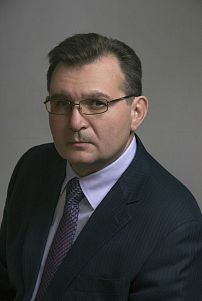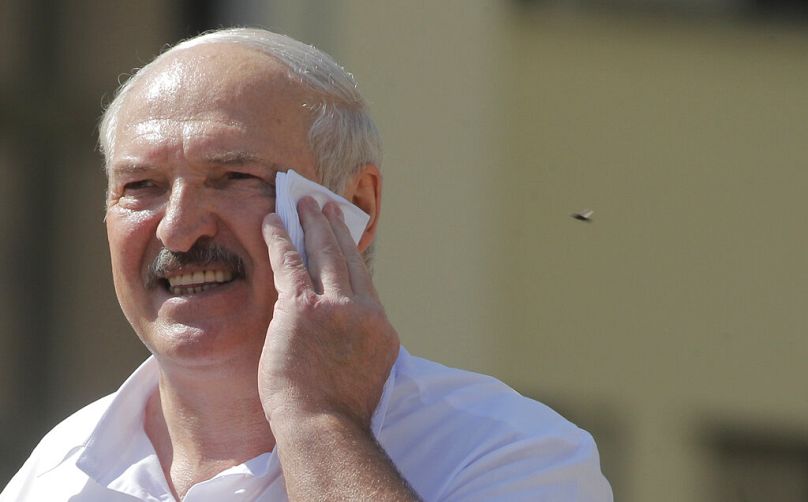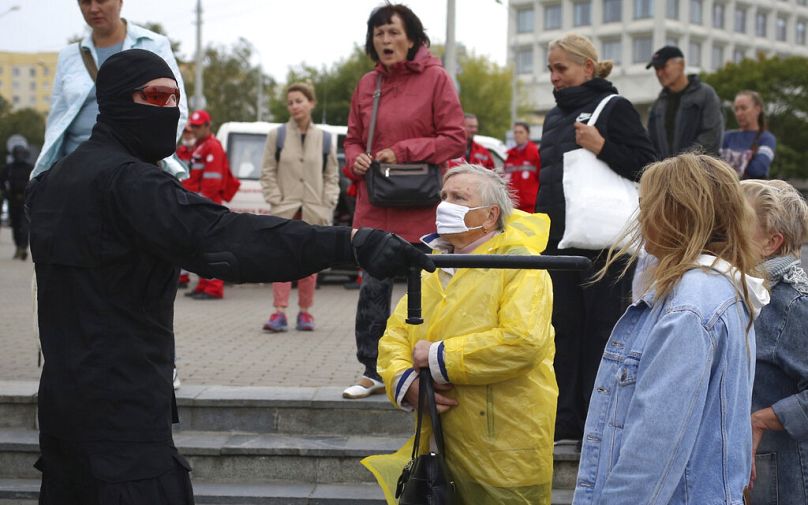“Under a dictatorship, there cannot be independent judges and courts," said disbarred lawyer Alexander Pylchenko. "Our country is not an exception."
In mid-August last year, Alexander Pylchenko made comments that would later change his life and end his career.
 ADVERTISEMENT
ADVERTISEMENT
 ADVERTISEMENT
ADVERTISEMENT
The lawyer was speaking as protests were erupting in ex-Soviet state Belarus over a disputed presidential election.
Alexander Lukashenko, dubbed Europe's last dictator, was declared to have picked up 80% of votes in the August 9 poll.
His critics cried foul and accused him of rigging the election. Thousands poured onto the streets. Then came a police crackdown on protesters.
“I made remarks [to the press] on the unprecedented violence used by the police and security forces against peaceful protestors; on the state inaction in stopping violence; on the inaction of law enforcement in situations when there were clear grounds for initiating criminal investigations; on the powers of the law enforcement officials that could have been used to prevent violence and hold the perpetrators accountable,” Pylchenko told Euronews.
Pylchenko has been a lawyer in the Belarusian justice system for 30 years. But those fateful remarks have changed that.
Just before Christmas, the Ministry of Justice"s Qualification Commission held a hearing in which Pylchenko was disbarred.
But the 55-year-old is not the only within his industry to have been targeted.
Maxim Znak and Ilya Salei are the lawyers of prominent opposition figure Maria Kalesnikava, who had initially managed the election campaign of Viktor Babariko, who had wanted to challenge Lukashenko in the August presidential poll. But, when he was arrested before the election, stopping him from running, Kalesnikava joined forces with Sviatlana Tsikhanouskaya. After the disputed vote, Kalesnikava was detained after refusing to leave the country.
Znak and Salei, like their client, were arrested, too, on the basis of “actions aimed at causing harm to the national security of the Republic of Belarus". They are two of 187 people that human rights NGO Viasna (Spring) consider political prisoners.
'No independent judges under a dictatorship'
While some may link the disbarring and arrests to a post-election crackdown on opposition to Lukashenko — which has seen protesters, journalists and even musicians targeted — others believe it exposes a long-term problem in Belarus.
“I do not think that we should use August as a starting point for these cases, similar episodes happened before," said Kanstantsin Dzehtsiarou, a professor of human rights law at the University of Liverpool. "The trend is much broader than these three cases and although in many instances the authorities do not go as far as licence revocation there are plenty of examples of censorship, influence and hostility towards defence lawyers working in the so-called political cases.”
“As lawyers, we were taught that everything must be done according to the law," said Pylchenko. "How can we work in this situation? We should either pretend that the law is followed or be outraged at the inability to work. I dared to show my outrage. They essentially stated 'If you cannot work in these conditions, then you will not work at all' and deprived me of the licence.
“Under a dictatorship, there cannot be independent judges and courts. Our country is not an exception. It is designed in [such] a way that there is only one person who has the power to make decisions – the president, with no limits on his stay in power."
'No justice, no judiciary'
Dzehtsiarou believes the justice system was flawed from the beginning and is a remnant of the country's Soviet past.
“One can hardly say that there is rule of law in Belarus at the moment," added Dzehtsiarou. "There is the rule of power, maybe the rule of necessity but not the rule of law. Some form of law exists only people but it does not exist for the authorities. The decisions in the so-called political cases are pre-determined, the decision-makers are hardly independent.
“It has become absolutely evident that there is no justice and no judiciary. The fact that masked police give generic evidence sending people to jail for 10 or 15 days shows that there is no independent judiciary in political cases. Almost none of the cases in the Belarusian courts are acquitted, and the system is heavily leaning towards conviction.
“These cases are well known and their main aim is perhaps to prevent other lawyers from actively engaging in political cases.”
Nevertheless, defence lawyers in Belarus are not entirely redundant, according to Dzehtsiarou. He said they play a role in making it fairer than it otherwise would be. While they might not overturn convictions or acquit innocent people, they still play a role in introducing a measure of transparency to the system itself, he added.
“In the grand scheme of things, this might not change the whole story, but it does make a difference on what the prosecutor can do because having a lawyer there means that anything the prosecutor does can become publicly known,” said Dzehtsiarou.
“Having a person there limits the capacity of the prosecutor to forge documents, put words in the mouth of the accused, and so forth. It is always a matter of degree – in other countries, a good lawyer might help you win the case. In Belarus, that is probably not the case. However, having a good lawyer can help remove irregularities from the prosecutors and the police.
“Usually though, lawyers understand the impossibility of breaking the existing system and count on getting the best out of bad results.”
Every weekday at 1900 CET, Uncovering Europe brings you a European story that goes beyond the headlines. Download the Euronews app to get an alert for this and other breaking news. It's available on Apple and Android devices.













